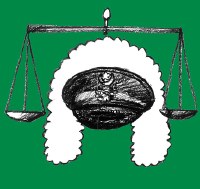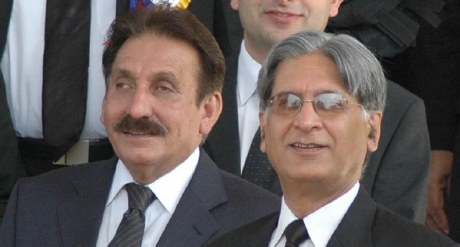Adil Najam
Much has happened in Pakistan over the last many weeks. Too much.
Amidst all the chaos and tragedy it has become difficult to keep track of just all that is happening, let alone make sense of it. It is clear that the dust has not settled yet. Far from it one can be sure that more turmoil and uncertainty is in the offing.
Yet, this we know. Gen. Musharraf sits firm in control; for now. A major national leader has been assassinated; and whether the elections are held or what might happen in them remains shrouded in doubt and speculation. The assault on the nation by extremists and terrorists have intensified. And the economy is taking a spin for the ordinary Pakistan. Despair is thick in the air and neither the military government, nor the political parties, nor the market forces seem to generate broad confidence or enthusiasm.
Adding to the despair is the fact that the two institutions of society that had begun to assert themselves and generate public support and confidence have been clipped violently. The media has been told what its “place” is and what can happen to its profits if it steps out of line. The judiciary has been revamped and the message sent out to newcomers to “learn” from the fate of their predecessors. These are classic authoritarian tactics: Increase the pressure, demonstrate the pain you can inflict, and highlight the fact that you are willing to inflict the pain if needed.
 Whatever one might think of the quality of the media before the clampdown or about the individual quality and character of individual judges is irrelevant to the fact that the descent of blatant authoritarian excess cannot but be bad for the country in both the short- and the long-term. Violence has a tendency to destroy not only those upon whom violence is inflict but also those who inflict violence. The las many weeks have not only weakened the institutions of the judiciary and the press, it has also – and, maybe, more so – damaged (further) the credibility of the military as an institution and of those in government.
Whatever one might think of the quality of the media before the clampdown or about the individual quality and character of individual judges is irrelevant to the fact that the descent of blatant authoritarian excess cannot but be bad for the country in both the short- and the long-term. Violence has a tendency to destroy not only those upon whom violence is inflict but also those who inflict violence. The las many weeks have not only weakened the institutions of the judiciary and the press, it has also – and, maybe, more so – damaged (further) the credibility of the military as an institution and of those in government.
These much more blatant authoritarian tactics have, indeed, allowed Gen. Musharraf to maintain his hold in power. The cost, however, is that to prolong his stay in power he will now find himself compelled to be ever more blatant and obvious in the use of such tactics. Ultimately, and this we know from history in Pakistan and elsewhere, either his ability to apply ever-more stringent pressure or the people’s ability to withstand it will give way and the house of cards will implode.
In the short term, however, one of the impacts of the turmoil and despair that has resulted, especially, from Benazir Bhutto’s assassination is that some news has suddenly gone off our radars. This is not a matter of conspiracy. It is a matter of “despair overload.” But the result is striking. The sentiment for an end of authoritarianism has not extinguished, but the fledgling movement for the restoration for the judiciary and media has been silenced; or, at least, quietened. One has been hearing less and less about Chief Justice Iftikhar Chaudhry or about Chaudhry Aitizaz Ahsan and given the fickleness of public attention and support one fears that the government might be succeeding in its attempts to have them fade away from the public imagination.
The cynics can say that this is because the supporters have themselves become silent, the support rallies have fizzled, the flowers are no longer going to the judges, and that the courts and the media are themselves now functioning again and the emergency has been lifted. All of this is true but none of this is conclusive.
It is quite clear, in fact, that Gen. Musharraf considers these two Chaudhries – Iftikhar and Aitizaz – to be the biggest threat to his power. Here is how:
Even though the exiled leaders Nawaz Sharif and Benazir Bhutto (now assassinated) have been allowed back into the country, even though the emergency has been lifted, even though the media curbs have been lifted, even though Gen. Musharraf has given up his uniform… despite all of this and more, the government is still not confident enough in their own power to release Iftikhar Chaudhry and Aitizaz Ahsan from detention. Everything else the General can manage. But these two Chaudhries are seen as having enough public support and credibility to be seen to be a threat to the General’s rule if allowed out in the open.
This is an extremely telling fact. It demonstrates who the military government thinks they can “manage” and who are considered to be “unmanageable.” The urge felt by the military government to suppress the voice of the two Chaudhries demonstrates how seriously the military government takes these two and the potential support they could muster.
It is interesting to ponder upon why the government would be more threatened by these two than by the mainstream political parties. It is not because these two are super-heroes. They are not. Both are flawed as all of us are. The threat they embody comes from the fact that, unlike the political parties, they have become spearheads (maybe reluctant spearheads) for a nascent movement whose goal is not as much to get a “share of the power” as it is to just see a real “restoration of democracy” and an “end to military rule.” Certainly Iftikhar Chaudhry did not set out to achieve this goal. He was for quite a while quite happy with how things were. Aitizaz Ahsan also did not set out to launch such a movement. But over the last half-year or more, the followers who have gathered around them have thrust this mission on them. It is a mission they now seem to embrace; or at least not shun. It is the nature of this goal that makes accommodation with them much more difficult for the government than with those who, in fact, want to be accommodated. This is exactly why it is important for the government to “control” these two much more than all others.
The unfortunate fact is that on this issue the government’s tactics may be working. Public interest is fickle. Public memory is short. And the overdose of other calamities is strong. Between all of this, the public attention is, and maybe has, been diverted elsewhere. One is reminded of the sheyr:
Reh gaya Mushtaq dil meiN rang-e-yaad-raftagaaN
Phool mehngay ho gaye, qubraiN purani ho gaeeN
Even if one does not agree with or like these two Chaudhries, it would be sad if, in fact, this is the case. The movement they embody is no longer about them. They are quite incidental to it. The movement and the moment that they came to symbolize was a movement and moment for civil society’s desire for democracy. In an environment where every institution of society was collapsing, they seemed to suggest that the democratic spirit – with its most idealistic aspirations – was still alive in Pakistan. The squashing of a judge and a lawyer is bad, but it is not catastrophic in societal terms. However, the squashing of a nation’s democratic spirit is monumental calamity. One fears that what we are seeing here is an attempt to do the latter much more than the former.




















































We dont belieeve on any personal in pakistan. All are fighting for their self not for the people of pakistan
hai brothers
i am sorry for commenting about your nation from a opposite side of your world – india. i dont think the problem is with army alone. democracy roots untill the people love for it. i remind you guys that you shared your joy when the army overthrown an legal legistimate goverment in early 2000s. but you havent united to tell the army that you need another democratic government not the army trucks roaring in your streets. though democracy can be argued that it is the one of the evil but it is the least evil with lot of checks and balances which each leader has to answer one or the other day. but it is not the same with the army.
this will be cyclical unless you show your resolve to show your happy face only when the democratic government takes its stage. we in india, though mostly we too know our politicians are corrupt but the system never taken our basic rights till date. even the emergency imposed by mrs. indira has shortlived and she is more apologistic to her behaviours.
though we have been in opposite side of your views in most cases please take our example of our matured democratic system.
While I fully support the ideals of the legal community, the media and the civil society in Pakistan for unfettered democracy and absolute rule of law, I think these ideals will just remain ideals until we in Pakistan have a powerful middle class that asserts its democratic rights. The fact is that Pakistan has been and still is ruled by a small elite of feudal lords, military officers, bureaucrats and industrialists. As a general rule, transition to industrialization being an essential component for democracy, the industrialists are a necessary evil to free societies from the clutches of the feudal system and let the average people become educated enough to think and act in their own best interest. While Musharraf has acted in an arbitrary manner as a military dictator, his economic policies have helped enlarge and strengthen the middle class in Pakistan. If this trend toward a larger, more powerful middle class continues, we can look forward to achieving the ideals of a civil society based on democratic institutions and rule of law within the next decade. Let’s not give up the ideals as we look forward to that day.
Aitzaz freed today!
@Khosa,
Well, as they say, better late than never. But one point must be stressed is that it is the PPP which has been the prime target of these military officials. Yes, NS also suffered in 1999–a fall out of the Kargil War–but no other force in Pakistan been so constantly hounded and perhaps will continue to be hounded like the PPP has been and will continue to be. As if the might of Pakistan’s military was not enough, the religious forces, beauracracy, LOTA political elements, media AND powerful intelligence ‘agencies’ have been busy cutting the PPP and the Bhuttos to size since 1977.
To some of us, badly disillusioned with the State of Pakistan after BB’s murder, justice needs to be done and to start out let’s understand how the Pakistani establishment has its used various powerful tools to hound the PPP/Bhuttos since 1977. That may be the beginning of a much needed healing process for Pakistan.